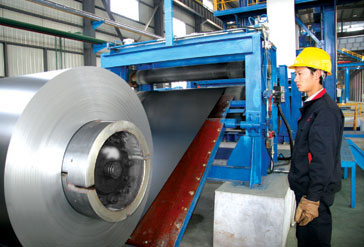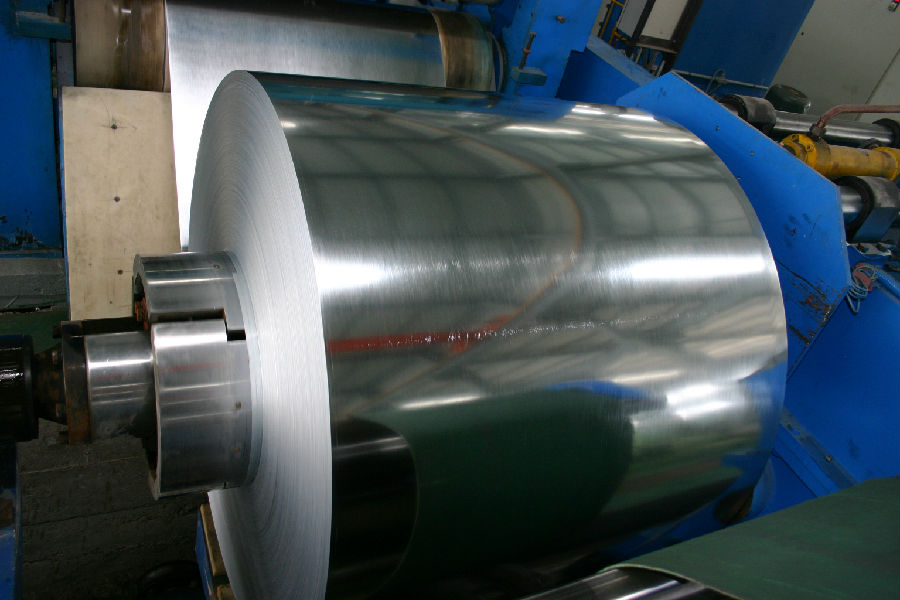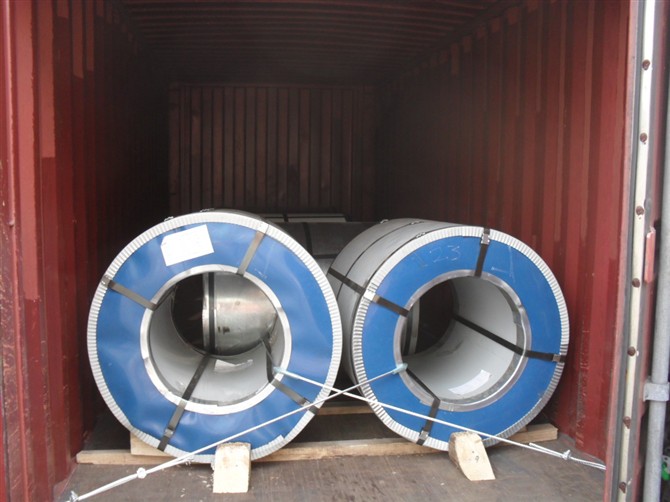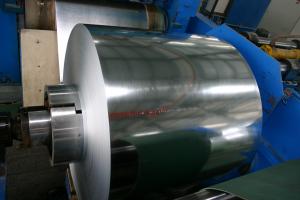HUIFU Prime Hot dip galvanized steel coil
- Loading Port:
- China Main Port
- Payment Terms:
- TT or LC
- Min Order Qty:
- -
- Supply Capability:
- 20000 Mt m.t./month
OKorder Service Pledge
OKorder Financial Service
You Might Also Like
PRODUCT DESCRIPTION:
Standard | JIS G 3302, ASTM A653, EN10327,10143,GB/T 2518 |
Grade | SPCC, DX51D+Z,CS Type A.B.C |
Zinc Coating | galvanized(GI) |
Zinc Weight | 40~140/m2 |
Thickness | 0.18mm~1.2mm |
Width | 762mm-1,250mm |
Coil weight | 3-20 tons |
Surface processing | Zero Spangle |
Coil Chemical Processing | Skin Pass,chromate,dry,oiled |
packing | waterproof paper and galvanized steel protection cover and steel strip packed Or as you request. |
Application | Construction, hardware, home appliances, interior decoration... |
Advantages | 1. Good experience producing and trading on PPGI/galvanized steel coil /steel sheet. With quality assurance and certification . 2.With technology strength and powerful. 3. Shortest delivery time . 4. authentication service and Sincere Caring Services. 5. We strive to be NO.1 of the same trade |



If you have any need of GI or PPGI Coil,please feel free to contact me.
Alena
- Q:Where can I find a great deal online for Danesco Stainless Steel Egg Poacher
- Danesco okorder /
- Q:hi, i have a steel block with an unussual composition. does anyone know if this is any particular type?c- .6%, si - .33%, mn - .6%, sulphur - .014%, phosphorous - .013%, ni - 1.69%, Cr, 1.07%, molybdenum - .67%
- You have opened a can of worms. Specific types of steel vary not only by composition but by the way they were made, their physical properties and their morphology (microscopic structure). The composition you have given would fit for High Carbon Steel and Medium Carbon Steel. Go to the reference I've given, it allows you to put in 3 of the components of your alloy and then it gives you a list of possibilities. You can open each candidate individually and see the full composition. Hours of fun. :)
- Q:What is current price of steel in US market?
- depends what u want..
- Q:How do steel coils perform in extreme weather conditions?
- Steel coils generally perform well in extreme weather conditions. Steel is a durable and strong material that can withstand high temperatures, extreme cold, and harsh weather elements such as rain, snow, and wind. It has excellent resistance to corrosion, making it suitable for various outdoor applications. However, it is important to note that the performance of steel coils can vary depending on factors such as the specific grade of steel used, protective coatings applied, and the maintenance and care provided.
- Q:How are steel coils used in the production of agricultural irrigation systems?
- Steel coils are used in the production of agricultural irrigation systems as they are often used to manufacture pipes and tubing. These coils are shaped and cut into specific lengths to create the necessary components for the irrigation systems. The steel material provides durability and strength to withstand the pressures and demands of distributing water in agricultural fields efficiently.
- Q:How are steel coils used in the production of storage tanks and silos?
- Steel coils are an essential component in the production of storage tanks and silos due to their strength and durability. These coils are typically made from high-quality steel and are processed through various manufacturing techniques to attain the desired thickness and shape. In the production process, steel coils are first uncoiled and then cut into specific sizes and lengths to meet the requirements of the storage tank or silo design. The coils are then shaped into cylindrical sections, using bending and rolling machines, to create the main body of the tank or silo. Once the desired shape is achieved, the coils are welded together to form a continuous and secure seam. This welding process ensures that the tanks and silos are leak-proof and can withstand the pressure exerted by the stored materials. Furthermore, steel coils also play a crucial role in reinforcing the structure of storage tanks and silos. They are often used to create the roofs, bottoms, and other structural components of these storage units. The strength and resilience of steel make it ideal for withstanding the weight of the stored materials and any external forces that may be exerted on the tank or silo. Additionally, steel coils can be coated or treated with protective materials to enhance their resistance to corrosion and extend their lifespan. This is particularly important for storage tanks and silos that are used to store corrosive substances or are exposed to harsh environmental conditions. Overall, steel coils are a fundamental element in the production of storage tanks and silos, providing the necessary strength, durability, and structural integrity required for these storage units.
- Q:What bike companies make the best Steel Road bikes?
- steel bikes are now mostly custom and expensive colnago lemond are factory [expensive] though giant doesn;t make them that i know of wle.
- Q:What are the challenges in storing and handling steel coils?
- Storing and handling steel coils pose several challenges due to their size, weight, and potential risks associated with their transportation and storage. Some of the challenges include: 1. Space requirements: Steel coils are generally large and bulky, requiring ample storage space. Finding suitable storage facilities that can accommodate the size and weight of the coils can be a challenge, especially in urban areas where space is limited. 2. Weight and handling: Steel coils can weigh several tons, making them difficult to handle safely. Specialized equipment such as cranes or forklifts with sufficient lifting capacity is necessary for moving and positioning the coils without causing damage or injury. 3. Stackability: Storing steel coils in a safe and efficient manner requires careful consideration of their stackability. Coils must be stacked in a way that prevents deformation or damage to the lower coils, ensuring stability and minimizing the risk of toppling. 4. Corrosion prevention: Steel coils are susceptible to corrosion, especially when exposed to moisture or harsh environmental conditions. Implementing proper corrosion prevention measures, such as protective coatings or climate-controlled storage, is crucial to maintain the quality and integrity of the coils. 5. Safety risks: Handling steel coils can be dangerous, as they can shift unexpectedly during transportation or storage. This poses a risk to workers involved in the handling process. Adequate training, appropriate personal protective equipment (PPE), and strict safety protocols are essential to minimize the potential for accidents or injuries. 6. Transportation challenges: Transporting steel coils from manufacturing facilities to storage facilities or end-users can be logistically complex. Coordinating the loading, securing, and unloading of the coils onto trucks or shipping containers requires careful planning and adherence to safety regulations. 7. Quality control: Steel coils must be stored and handled in a way that maintains their quality. Any mishandling or improper storage conditions can lead to deformations, scratches, or other defects that can affect the performance and value of the steel. Overall, the challenges in storing and handling steel coils require attention to detail, proper equipment, and adherence to safety protocols to ensure the integrity of the product, the safety of workers, and the efficiency of operations.
- Q:What are the different types of steel coil grades and specifications?
- In the market, one can find a variety of steel coil grades and specifications. These grades and specifications cater to different industry needs and applications. Several commonly used types include: 1. Hot Rolled Steel Coils: These coils are manufactured by heating the steel above its recrystallization temperature and then rolling it at a high temperature. They are often used in applications where dimensional accuracy and surface finish are not crucial. 2. Cold Rolled Steel Coils: Cold rolled steel coils are produced by subjecting hot rolled coils to further processing in cold reduction mills. This process enhances surface finish, tightens tolerances, and increases strength compared to hot rolled coils. They find wide applications in the automotive, construction, and electrical industries. 3. Galvanized Steel Coils: These coils are coated with a layer of zinc to protect them from corrosion. Galvanization improves the durability and longevity of the steel coils. They are commonly used in roofing, fencing, and automotive body parts. 4. Stainless Steel Coils: Made from a combination of iron, chromium, and other elements, stainless steel coils offer excellent corrosion resistance and high strength. They are widely used in industries such as food processing, chemical, and medical, where hygiene and corrosion resistance are critical. 5. High-strength Low-alloy (HSLA) Steel Coils: HSLA steel coils are designed to possess higher strength and improved formability compared to conventional carbon steels. They are commonly employed in structural and transportation applications where weight reduction and high strength are required. 6. Electrical Steel Coils: Also known as silicon steel or transformer steel, these coils are specifically designed for electrical equipment like transformers, motors, and generators. They exhibit low core losses and high magnetic permeability, ensuring efficient energy transfer. 7. Tool Steel Coils: Tool steel coils are specially formulated to possess high hardness, wear resistance, and toughness. They are commonly used in the production of cutting tools, dies, and molds. These examples represent only a fraction of the steel coil grades and specifications available in the market. The choice of the appropriate grade and specification depends on specific application requirements, such as strength, corrosion resistance, formability, and surface finish.
- Q:How are steel coils processed for painting or coating?
- Steel coils are processed for painting or coating through a series of steps. First, the coils are cleaned and treated to remove any impurities, such as oil, dirt, or rust, using chemical treatments or mechanical methods like abrasive blasting. Then, a primer or base coat is applied to enhance adhesion and provide corrosion resistance. After drying, the topcoat or finishing coat is applied using various techniques like coil coating, electrostatic spraying, or powder coating. Finally, the coated steel coils undergo curing or baking at high temperatures to ensure proper adhesion and durability of the paint or coating.
1. Manufacturer Overview |
|
|---|---|
| Location | |
| Year Established | |
| Annual Output Value | |
| Main Markets | |
| Company Certifications | |
2. Manufacturer Certificates |
|
|---|---|
| a) Certification Name | |
| Range | |
| Reference | |
| Validity Period | |
3. Manufacturer Capability |
|
|---|---|
| a)Trade Capacity | |
| Nearest Port | |
| Export Percentage | |
| No.of Employees in Trade Department | |
| Language Spoken: | |
| b)Factory Information | |
| Factory Size: | |
| No. of Production Lines | |
| Contract Manufacturing | |
| Product Price Range | |
Send your message to us
HUIFU Prime Hot dip galvanized steel coil
- Loading Port:
- China Main Port
- Payment Terms:
- TT or LC
- Min Order Qty:
- -
- Supply Capability:
- 20000 Mt m.t./month
OKorder Service Pledge
OKorder Financial Service
Similar products
New products
Hot products
Related keywords




























